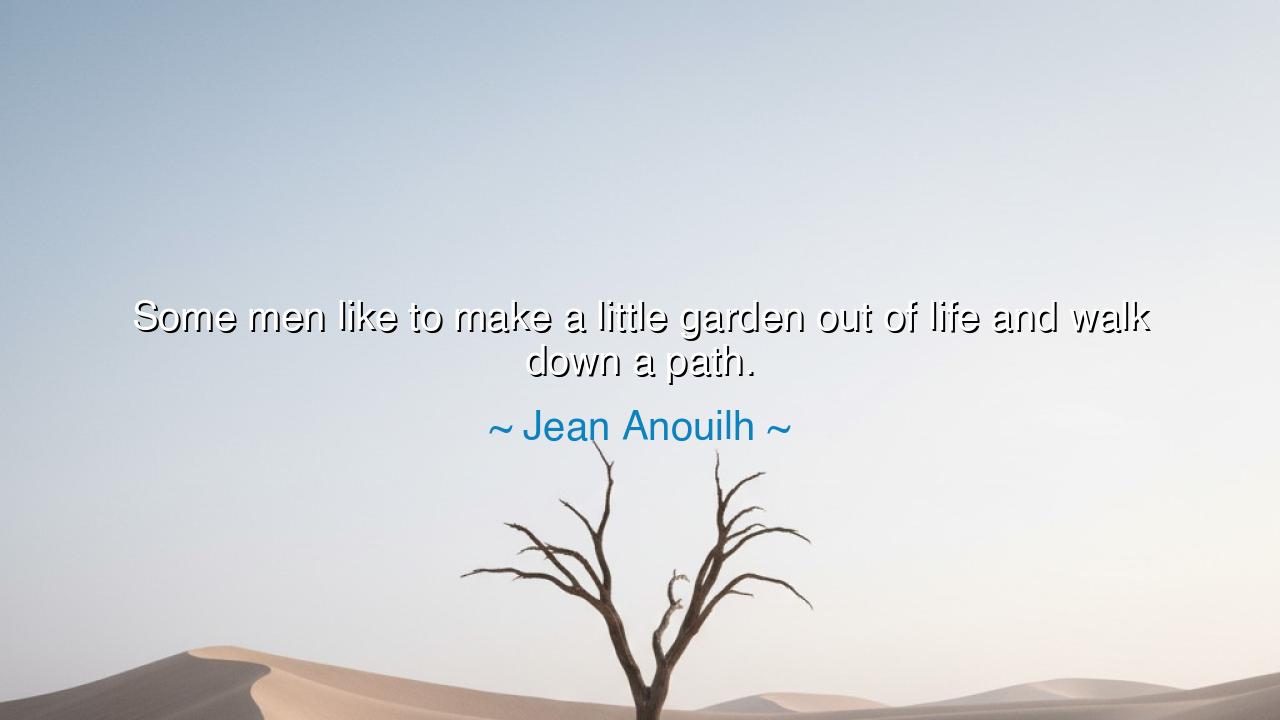
Some men like to make a little garden out of life and walk down a






In the garden of life, there are those who seek to cultivate a space of peace, simplicity, and purpose. Jean Anouilh offers us a striking reflection when he says, "Some men like to make a little garden out of life and walk down a path." These words carry within them the essence of a profound choice—a choice to shape life with intention, to carve out a space of serenity amidst the chaos of the world. The garden here is not merely a physical space but a metaphor for the life one chooses to build—a life that is tended with care, guided by principles, and shaped by conscious decisions. To walk down that path is to step into a life of clarity and purpose, where each step is taken with understanding, and each action is a deliberate choice.
The ancients understood well the symbolism of the garden as a place of cultivation, both of the earth and of the soul. In ancient Greece, the philosopher Epicurus spoke of the importance of simplicity in life. He believed that the pursuit of pleasure, in its truest form, came not from excess, but from cultivating serenity through balance, moderation, and understanding. To Epicurus, the garden was a sacred place, a space for reflection and peace, where the wise could tend to their inner worlds as they tended to their outer ones. Similarly, Anouilh’s metaphor of the garden reflects this ancient longing for a life of order and purpose, where the gardener—akin to the philosopher—chooses the seeds they plant and the path they walk.
In the ancient world, the garden was also a symbol of the cosmos, a space that mirrored the natural order of life and the universe. The Egyptians, who created magnificent gardens around their temples and palaces, saw the act of cultivating plants as an act of alignment with the divine. Their gardens were not merely aesthetic creations; they were sacred places where the cycle of life and death could be observed, and where individuals could connect with the eternal truths of existence. In the same way, the garden of life—represented in Anouilh’s quote—becomes a path towards spiritual harmony, a conscious decision to walk in balance with the rhythms of the universe. Just as the Egyptians understood the garden as a microcosm of the world, so too do we shape our lives with the seeds we choose to plant.
To make a garden out of life is not merely to seek beauty or tranquility, but to create a space where meaning can grow. The Romans, in their love of gardens, saw these spaces as places of reflection and rejuvenation. Their grand villas, surrounded by lush gardens, were not just for leisure, but for deeper contemplation. The gardens were designed with great intention, each tree, each flower, placed thoughtfully to create a harmony that echoed the philosophical ideals they held dear. In Anouilh’s words, the act of making a garden out of life calls us to choose what we cultivate—what values, beliefs, and practices we allow to take root in our hearts and minds. It is an invitation to create a life that is both beautiful and meaningful, a life where we actively choose the path we walk.
The path, in Anouilh’s metaphor, is the journey we undertake through life. The path is formed by the decisions we make, the relationships we nurture, and the goals we pursue. The journey is never easy, and it is often filled with obstacles, twists, and turns. Yet, the path we choose can be one of purpose and peace if we approach it with intention. Confucius, the great Chinese philosopher, taught that the path of a virtuous life was one that was walked with careful consideration and conscious choice. To walk a path is not to simply go where life leads us, but to choose our direction, to shape our lives according to principles that are true and good. Just as one cultivates a garden with care, so too must we cultivate the way we live, with mindfulness and awareness.
A real-life example of choosing a path through life can be found in the life of Mahatma Gandhi. Gandhi, though faced with immense hardship, chose to walk a path of nonviolence, truth, and self-discipline. His life was a garden of principles, where each action, each decision, was made with the greater good in mind. Gandhi’s journey was not without its difficulties, but it was one that was lived with purpose—a reflection of Anouilh’s notion of creating a path in life that is both deliberate and meaningful. Just as the gardener must tend to the land, so too must we tend to our lives, planting the seeds of integrity and wisdom and walking a path that reflects those values.
The lesson here is clear: to make a garden out of life is to choose purpose over passivity, to walk a path of intention rather than drift aimlessly. We are called to be active participants in the creation of our lives, to cultivate the values, relationships, and environments that nourish our souls. The garden is not simply a place of beauty but a symbol of the work we put into shaping our lives. The path we walk is one that is carved by the choices we make, and it is up to us to decide whether we walk it with care, respect, and vision. Let us remember that life, like a garden, requires effort, thoughtfulness, and dedication. As we tend to our gardens, so too must we tend to our lives, cultivating meaning, beauty, and purpose at every step. May we walk the path of the gardener—intentional, reflective, and ever mindful of the beauty we wish to grow.






AAdministratorAdministrator
Welcome, honored guests. Please leave a comment, we will respond soon